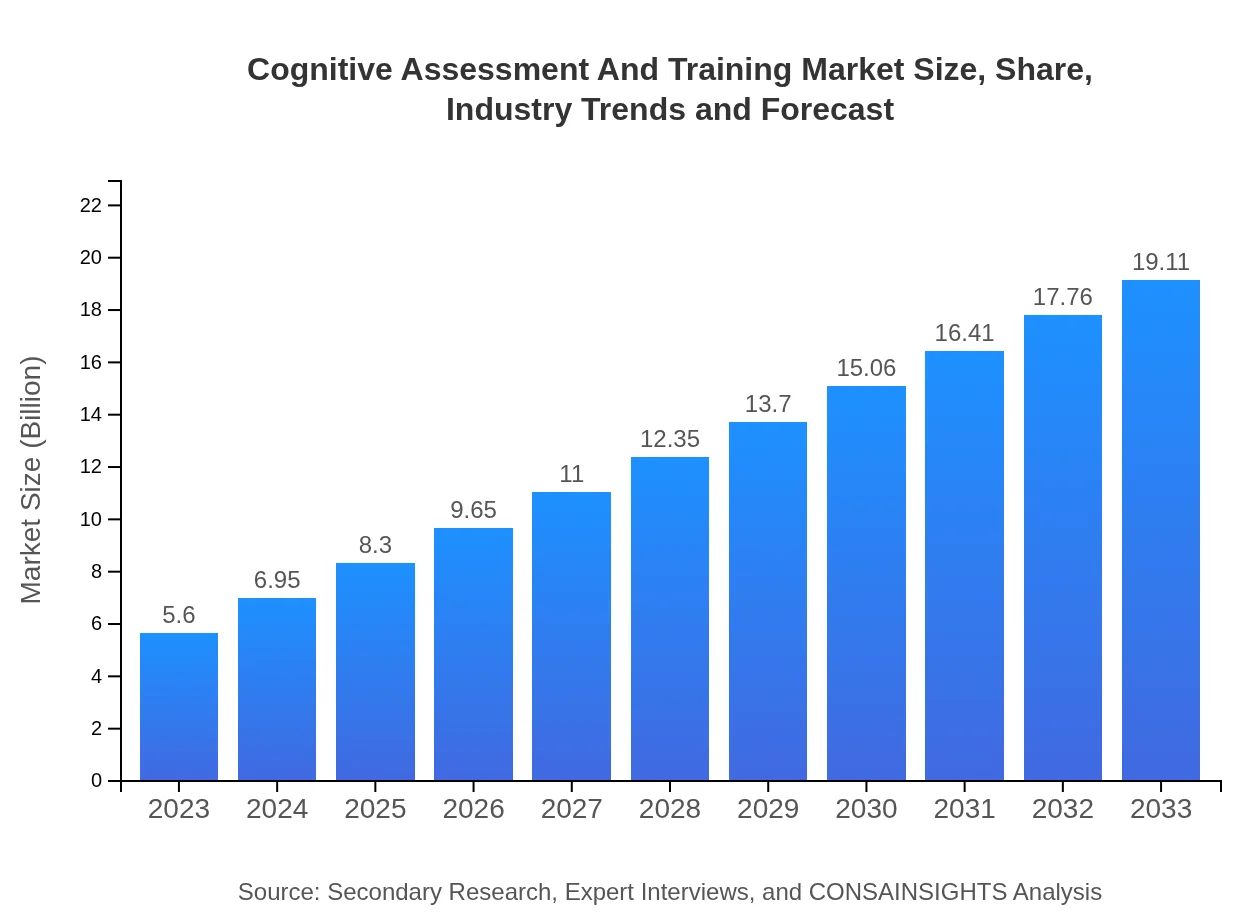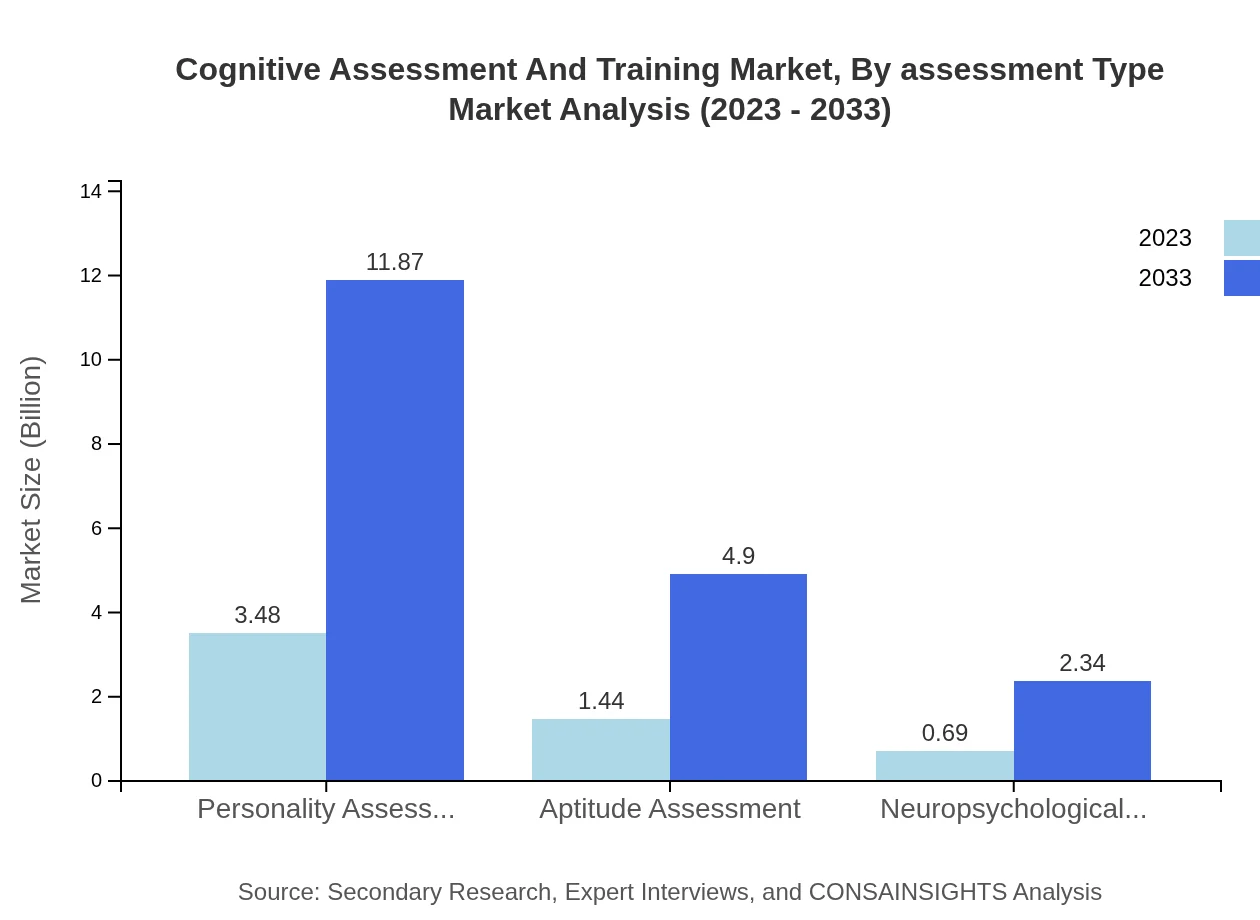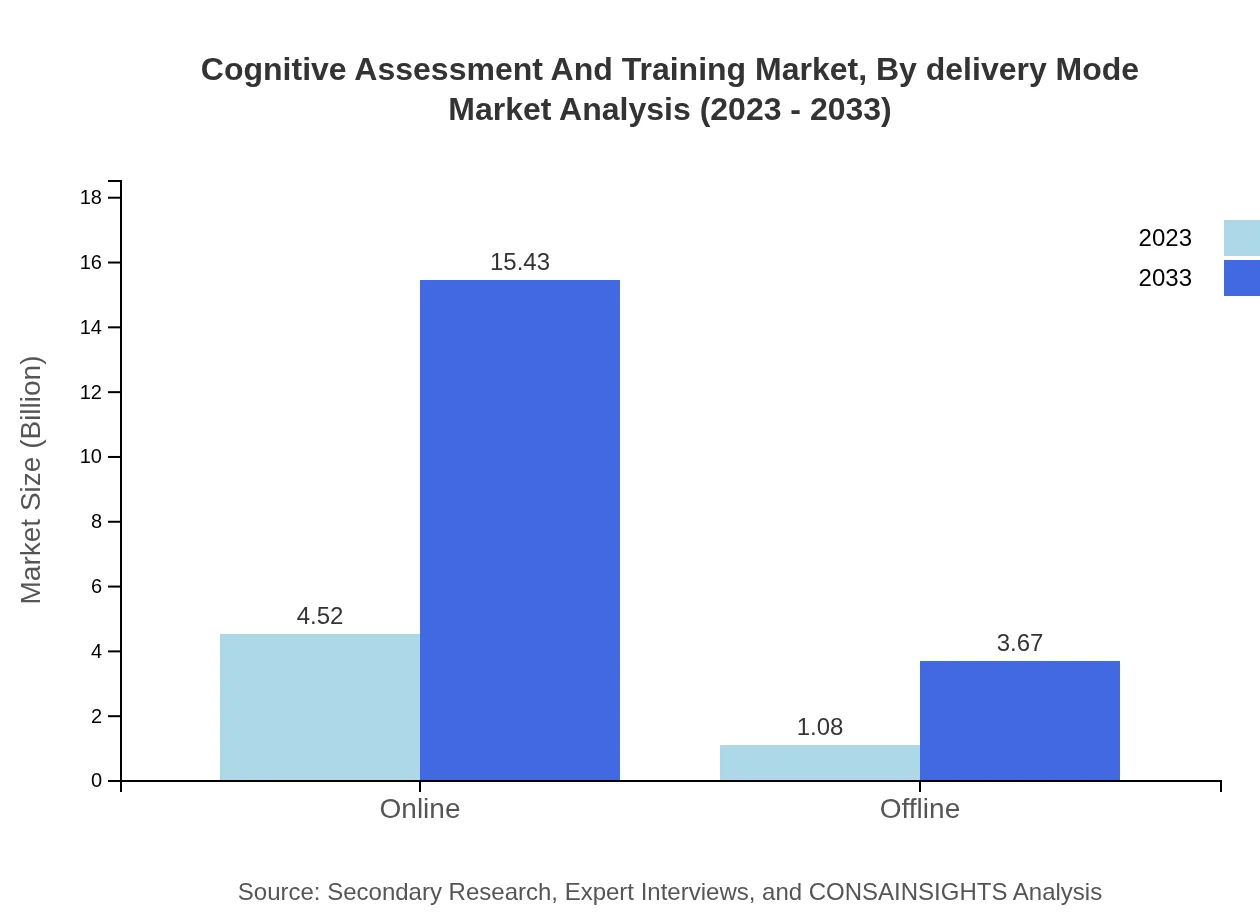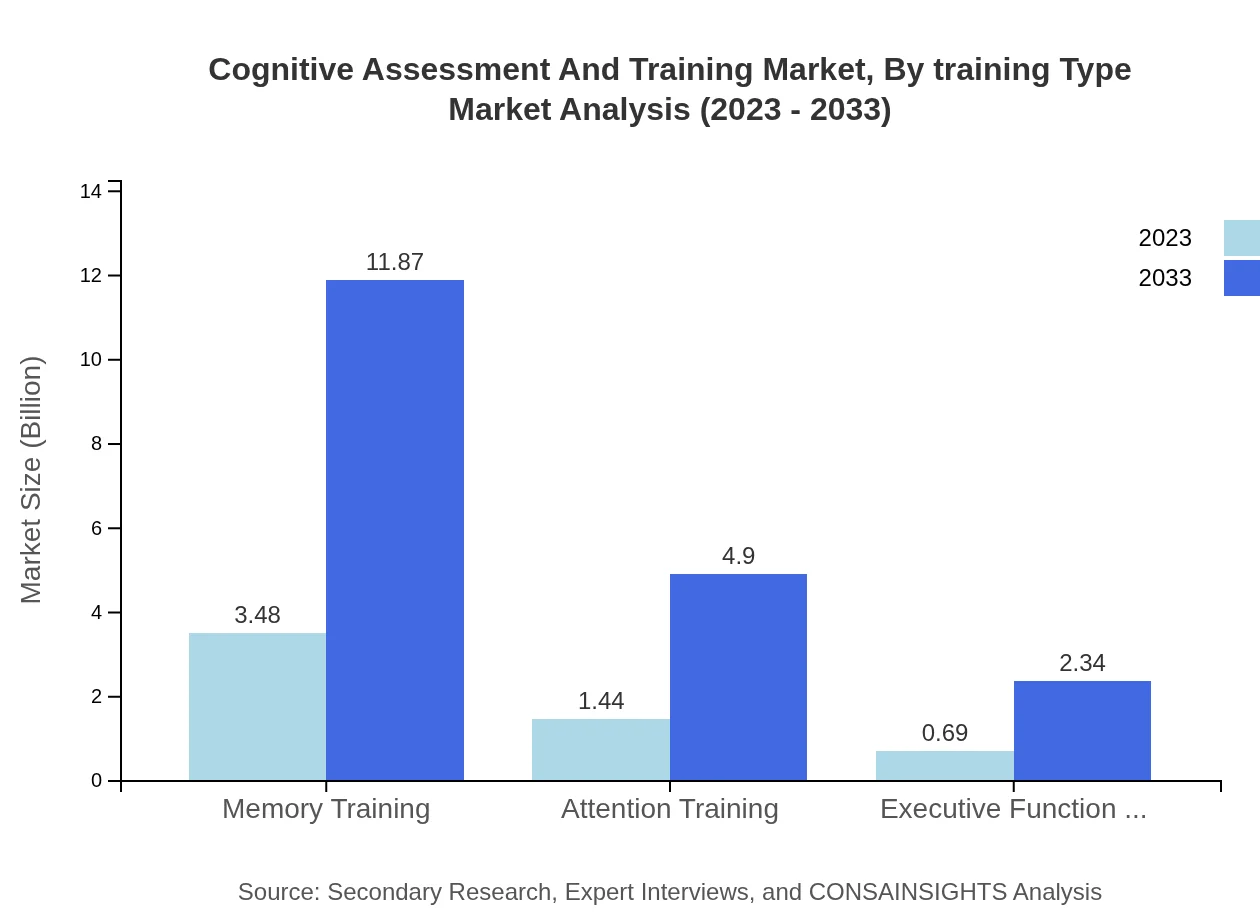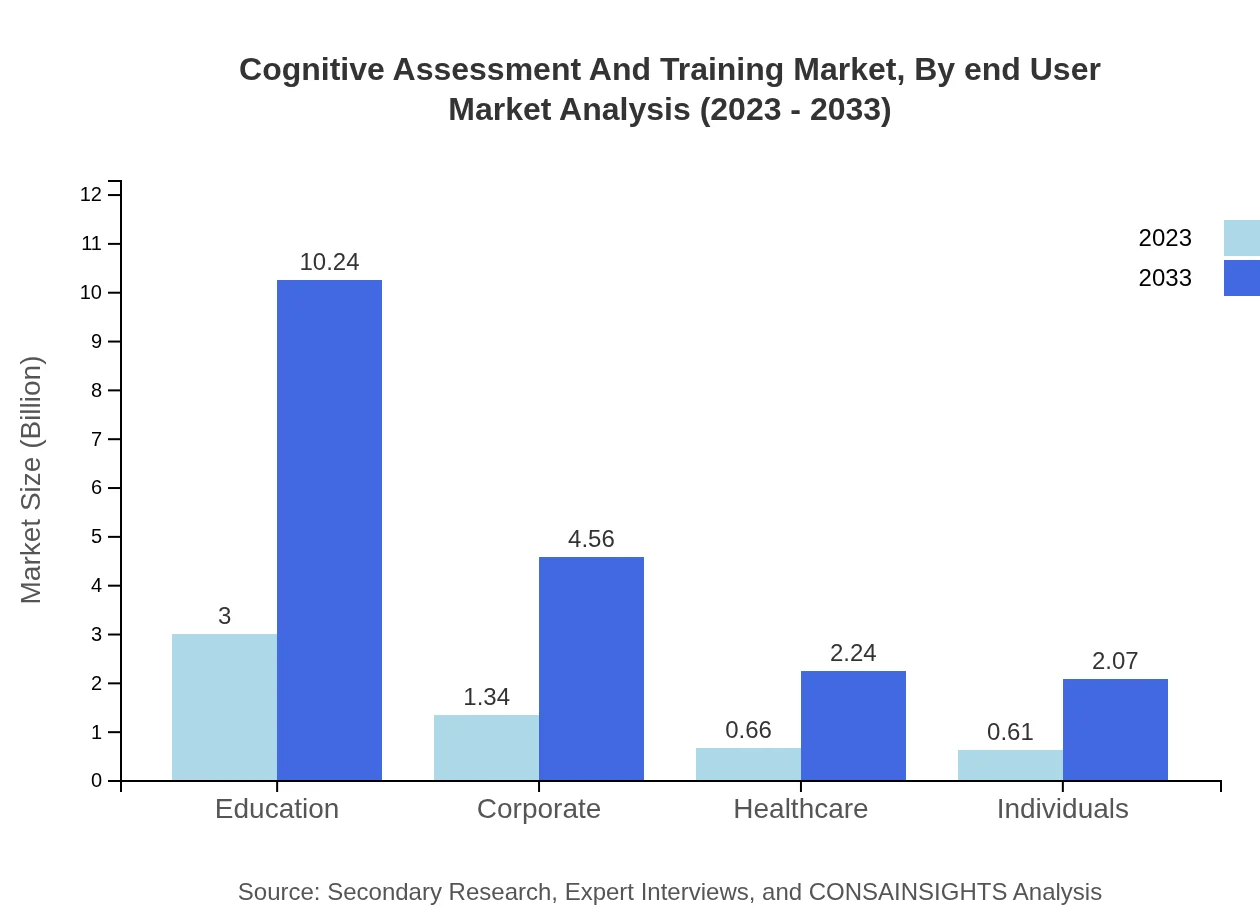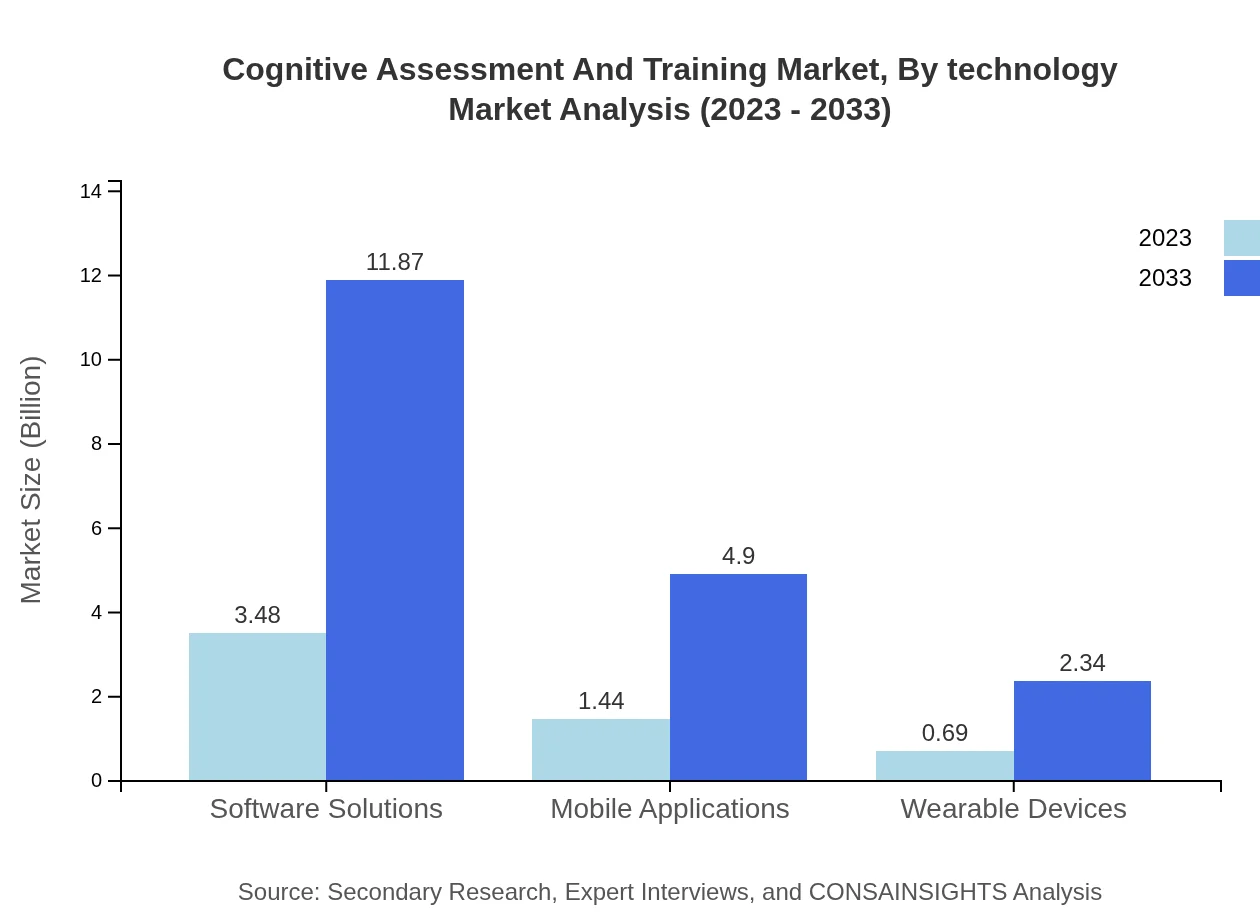Cognitive Assessment And Training Market Report
Published Date: 02 February 2026 | Report Code: cognitive-assessment-and-training
Cognitive Assessment And Training Market Size, Share, Industry Trends and Forecast to 2033
This report provides a comprehensive analysis of the Cognitive Assessment and Training market, including insights on market trends, size, segmentation, and forecasts from 2023 to 2033. It highlights growth opportunities and challenges within the industry.
| Metric | Value |
|---|---|
| Study Period | 2023 - 2033 |
| 2023 Market Size | $5.60 Billion |
| CAGR (2023-2033) | 12.5% |
| 2033 Market Size | $19.11 Billion |
| Top Companies | Pearson Clinical, McGraw Hill Education, Lumosity, MindGym |
| Last Modified Date | 02 February 2026 |
Cognitive Assessment And Training Market Overview
Customize Cognitive Assessment And Training Market Report market research report
- ✔ Get in-depth analysis of Cognitive Assessment And Training market size, growth, and forecasts.
- ✔ Understand Cognitive Assessment And Training's regional dynamics and industry-specific trends.
- ✔ Identify potential applications, end-user demand, and growth segments in Cognitive Assessment And Training
What is the Market Size & CAGR of Cognitive Assessment And Training market in 2023?
Cognitive Assessment And Training Industry Analysis
Cognitive Assessment And Training Market Segmentation and Scope
Tell us your focus area and get a customized research report.
Cognitive Assessment And Training Market Analysis Report by Region
Europe Cognitive Assessment And Training Market Report:
Europe's Cognitive Assessment and Training market is forecasted to expand from $1.70 billion in 2023 to $5.81 billion by 2033. Rising government initiatives promoting cognitive skill training and increasing investment in academic performance improvement programs are key factors.Asia Pacific Cognitive Assessment And Training Market Report:
In the Asia Pacific region, the Cognitive Assessment and Training market was valued at $1.07 billion in 2023 and is projected to reach $3.64 billion by 2033. Rapid urbanization, increased investment in education technology, and the growing focus on mental health awareness are key drivers of this growth.North America Cognitive Assessment And Training Market Report:
North America, a early adopter of cognitive training technologies, saw the market valued at $1.99 billion in 2023, with an anticipated growth to $6.79 billion by 2033. The strong presence of technology firms and emphasis on personalized education solutions bolster market expansion.South America Cognitive Assessment And Training Market Report:
South America is seeing gradual growth in the Cognitive Assessment and Training market, initially valued at $0.51 billion in 2023, with expectations to grow to $1.73 billion by 2033. This is driven by improvements in educational systems and awareness of cognitive development among institutions.Middle East & Africa Cognitive Assessment And Training Market Report:
The Cognitive Assessment and Training market in the Middle East and Africa is set to grow from $0.33 billion in 2023 to $1.13 billion by 2033. This growth is attributed to emerging educational reforms and the integration of technology in educational institutions.Tell us your focus area and get a customized research report.
Cognitive Assessment And Training Market Analysis By Assessment Type
The assessment type segment contributes significantly to the Cognitive Assessment and Training market. In 2023, Memory Training accounted for $3.48 billion, with expectations to reach $11.87 billion by 2033. Personality and Aptitude Assessments also showed growth, suggesting a strong preference for varied cognitive evaluations in different sectors.
Cognitive Assessment And Training Market Analysis By Delivery Mode
The online delivery mode of cognitive assessment and training is dominant, encompassing $4.52 billion in 2023 and projected to rise to $15.43 billion by 2033. This trend is fueled by the digitalization of education and training processes, increasing accessibility to learning resources.
Cognitive Assessment And Training Market Analysis By Training Type
In the training type segment, corporate training represented a substantial portion, coming in at $1.34 billion in 2023, expected to surge to $4.56 billion by 2033, emphasizing a shift towards developing employee cognitive skills in organizations.
Cognitive Assessment And Training Market Analysis By End User
The educational sector leads as the largest end-user, with a market size of $3.00 billion in 2023 likely to grow to $10.24 billion by 2033. This signals the growing emphasis on cognitive training in schools and colleges to enhance academic performance.
Cognitive Assessment And Training Market Analysis By Technology
Technological integration in cognitive assessment tools is a vital growth factor. The use of AI in software solutions showcases a market size of $3.48 billion in 2023, projected to reach $11.87 billion by 2033. This trend enhances the personalization and effectiveness of training programs.
Cognitive Assessment And Training Market Trends and Future Forecast
Tell us your focus area and get a customized research report.
Global Market Leaders and Top Companies in Cognitive Assessment And Training Industry
Pearson Clinical:
A leading provider of educational resources and assessment tools, Pearson Clinical focuses on cognitive assessment solutions, helping educators and clinicians evaluate learning abilities.McGraw Hill Education:
Known for its educational content, McGraw Hill provides cognitive training solutions aimed at improving educational outcomes through effective assessment methodologies.Lumosity:
An interactive platform offering cognitive training games designed to enhance memory, attention, and problem-solving skills, Lumosity has become synonymous with cognitive training.MindGym:
A corporate training organization that specializes in improving workplace performance through cognitive exercises, MindGym delivers innovative training modules directly to employees.We're grateful to work with incredible clients.









FAQs
What is the market size of cognitive Assessment And Training?
The cognitive assessment and training market is currently valued at approximately $5.6 billion, with a projected compound annual growth rate (CAGR) of 12.5% from 2023 to 2033. This indicates significant growth potential over the next decade.
What are the key market players or companies in this cognitive Assessment And Training industry?
Key players in the cognitive assessment and training industry include major corporations like Pearson, Birkman International, and TalentSmart. These companies play significant roles in developing assessment tools and cognitive training programs, contributing to industry advancements and innovations.
What are the primary factors driving the growth in the cognitive Assessment And Training industry?
The growth in the cognitive assessment and training industry is driven by increasing demand for skill assessment in education, corporate training, and mental health awareness. Technological advancements and a growing focus on individual cognitive development also contribute significantly to market expansion.
Which region is the fastest Growing in the cognitive Assessment And Training?
The fastest-growing region in the cognitive assessment and training market is North America, projected to grow from $1.99 billion in 2023 to $6.79 billion by 2033. Europe and Asia Pacific also show robust growth, with significant expansions in respective markets.
Does ConsaInsights provide customized market report data for the cognitive Assessment And Training industry?
Yes, ConsaInsights offers customized market report data tailored to specific needs within the cognitive assessment and training industry. This customization ensures clients receive relevant insights for informed decision-making and strategy development.
What deliverables can I expect from this cognitive Assessment And Training market research project?
Deliverables from a cognitive assessment and training market research project include comprehensive market analysis, segmented data reports, regional insights, and competitor analysis, along with actionable recommendations for business strategies.
What are the market trends of cognitive Assessment And Training?
Key market trends in cognitive assessment and training include a rise in online and mobile training platforms, increased adoption of AI-driven technologies for assessments, and a focus on personalized learning experiences in educational and corporate settings.

